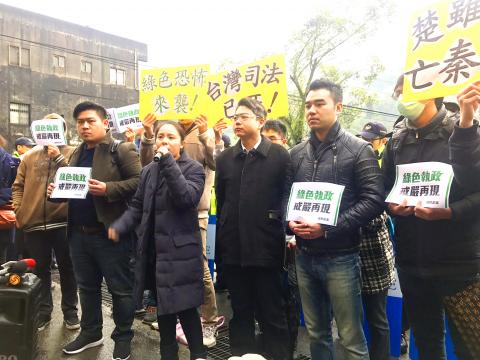The New Party yesterday decried what it said was the Democratic Progressive Party’s (DPP) “barbaric arrest” of four of its members for alleged violations of the National Security Act (國家安全法).
Investigation Bureau officers at about 6:30am yesterday raided the homes of New Party spokesman Wang Ping-chung (王炳忠) and party members Hou Han-ting (侯漢廷), Lin Ming-cheng (林明正) and Chen Ssu-chun (陳斯俊) in Taipei and New Taipei City, seizing documents, computers and cellphones, and taking the four to the bureau for questioning on the grounds that they allegedly collected and provided intelligence to the Chinese Communist Party (CCP).
“What intelligence could they possibly collect and provide? What have they done other than openly oppose [Taiwanese] independence and advocate unification” between Taiwan and China, New Party Deputy Chairman Lee Sheng-feng (李勝峰) told a news conference in Taipei.

Photo: CNA
Wang, Hou and Lin are household names for their anti-independence, pro-unification remarks in the media, and by targeting the three most well-known young members of the party, the DPP is attempting to silence the New Party, Lee said.
Wang’s lawyer, Chen Li-ling (陳麗玲), said the four were denied the right to seek legal assistance before their arrest, because they were initially slated to be summoned as witnesses at 8:30am yesterday.
“However, their residences were raided at 6am, which was a procedural violation,” she added.
By perpetrating a move that is reckless, barbaric and “messed up,” the DPP is forcing the public to rebel, and the New Party will respond by devoting itself to the local elections next year to overthrow the DPP to let it “feel people’s wrath and bring about justice,” he said.
The four were arrested in connection with an espionage case implicating alleged Chinese spy Zhou Hongxu (周泓旭), Lee said, but added that he did not know Zhou personally, nor did he know how close Zhou was with the four men.
“The DPP can ignore the need to drive economic growth and discourage diversity. However, it will never take away the pride of being Chinese from New Party Youth Corps members,” New Party Youth Corps head Yang Shih-kuang (楊世光) said, adding that his party would do everything in its power to clear his colleagues’ names through legal action.
New Party member Kolan Kaoti (戈蘭高地), who provided Chen Ssu-chun with accommodation, said she was terrified and compared the investigators to Gestapo because they made a mess of Chen Ssu-chun’s belongings.
“The move was like a reprise of the White Terror,” she said.
“The DPP will have bad karma for the many evil deeds it has done,” Hou’s mother said.
Separately, Chinese Nationalist Party (KMT) spokesman Hung Meng-kai (洪孟楷) said the raids and arrests were disproportionate, as authorities did not have enough evidence to prove that the four had committed an offense.
The move has raised public concern that the DPP is reinstating martial law, he said, urging investigators and prosecutors to promptly give an explanation to ease concerns.
Deputy Minister of Justice Chen Ming-tang (陳明堂) said he knew the details of the case, but declined to elaborate, citing the confidentiality principle on cases under investigation.

Chinese Nationalist Party (KMT) Chairman Eric Chu (朱立倫), spokeswoman Yang Chih-yu (楊智伃) and Legislator Hsieh Lung-chieh (謝龍介) would be summoned by police for questioning for leading an illegal assembly on Thursday evening last week, Minister of the Interior Liu Shyh-fang (劉世芳) said today. The three KMT officials led an assembly outside the Taipei City Prosecutors’ Office, a restricted area where public assembly is not allowed, protesting the questioning of several KMT staff and searches of KMT headquarters and offices in a recall petition forgery case. Chu, Yang and Hsieh are all suspected of contravening the Assembly and Parade Act (集會遊行法) by holding

PRAISE: Japanese visitor Takashi Kubota said the Taiwanese temple architecture images showcased in the AI Art Gallery were the most impressive displays he saw Taiwan does not have an official pavilion at the World Expo in Osaka, Japan, because of its diplomatic predicament, but the government-backed Tech World pavilion is drawing interest with its unique recreations of works by Taiwanese artists. The pavilion features an artificial intelligence (AI)-based art gallery showcasing works of famous Taiwanese artists from the Japanese colonial period using innovative technologies. Among its main simulated displays are Eastern gouache paintings by Chen Chin (陳進), Lin Yu-shan (林玉山) and Kuo Hsueh-hu (郭雪湖), who were the three young Taiwanese painters selected for the East Asian Painting exhibition in 1927. Gouache is a water-based

Taiwan would welcome the return of Honduras as a diplomatic ally if its next president decides to make such a move, Minister of Foreign Affairs Lin Chia-lung (林佳龍) said yesterday. “Of course, we would welcome Honduras if they want to restore diplomatic ties with Taiwan after their elections,” Lin said at a meeting of the legislature’s Foreign Affairs and National Defense Committee, when asked to comment on statements made by two of the three Honduran presidential candidates during the presidential campaign in the Central American country. Taiwan is paying close attention to the region as a whole in the wake of a

OFF-TARGET: More than 30,000 participants were expected to take part in the Games next month, but only 6,550 foreign and 19,400 Taiwanese athletes have registered Taipei city councilors yesterday blasted the organizers of next month’s World Masters Games over sudden timetable and venue changes, which they said have caused thousands of participants to back out of the international sporting event, among other organizational issues. They also cited visa delays and political interference by China as reasons many foreign athletes are requesting refunds for the event, to be held from May 17 to 30. Jointly organized by the Taipei and New Taipei City governments, the games have been rocked by numerous controversies since preparations began in 2020. Taipei City Councilor Lin Yen-feng (林延鳳) said yesterday that new measures by